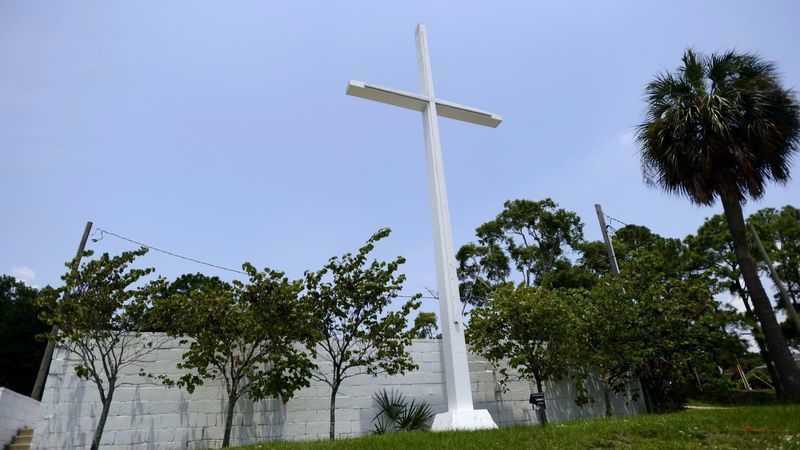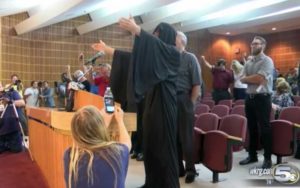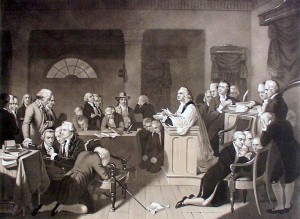 ATLANTA, Ga. — The 11th Circuit Court of Appeals has reversed its ruling upholding a lower court order to remove a cross display in Florida, and as per the guidance of the U.S. Supreme Court upon remand, has rather found that its public placement does not infringe the Constitution and that taking it down could be perceived as government hostility toward religion.
ATLANTA, Ga. — The 11th Circuit Court of Appeals has reversed its ruling upholding a lower court order to remove a cross display in Florida, and as per the guidance of the U.S. Supreme Court upon remand, has rather found that its public placement does not infringe the Constitution and that taking it down could be perceived as government hostility toward religion.
“This is Pensacola Cross Case 2.0,” Judge Kevin Newsom wrote in opening the court’s new opinion. “Having reconsidered this case in light of American Legion, we conclude that the Supreme Court’s decision abrogates [circuit precedent], and that when American Legion is applied, Pensacola’s maintenance of the Bayview Park Cross does not violate the First Amendment.”
BY WHAT STANDARD?
Newsom — a Trump nominee, along with Charles Ashley Royal and Frank Hull — Bush and Clinton nominees respectively, served as the original judges on the appeal in 2018, reluctantly upholding the order to tear down the cross out of a sense of obligation to legal precedent but asking an en banc court to overturn the decision to make way for the 34-foot park display to stay.
“Rabun was wrong the day it was decided … And to make matters worse, Rabun has only gotten more wrong as time has passed,” Newsom wrote at the time, referring to the case of ACLU v. Rabun County Chamber of Commerce, which found that a cross monument that “[shines] over the North Georgia Mountains” is unconstitutional.
He also expressed frustration with the inconsistent standards used by the U.S. Supreme Court in analyzing Establishment Clause cases.
“So, in the light of the Supreme Court’s most recent decisions, how exactly, should the Bayview Park cross’s constitutionality be determined? What Establishment Clause analysis applies? Frankly, it’s hard to say,” Newsom said. “The Court’s Establishment Clause jurisprudence is, to use a technical legal term of art, a hot mess.”
In June 2017, U.S. District Court Judge Roger Vinson, who initially ruled that the cross must come down, was likewise hesitant in his ruling. He similarly outlined his belief that there is a difference between the original intent of the Founding Fathers regarding the Establishment Clause and the various case law that he felt bound to follow.
“[H]ow is the Bayview Cross supposed to be analyzed? By applying [the] Lemon [standard]; one of the other tests; or no formal test at all?” he wrote. “May I look to what the Founding Fathers intended (in which case the cross is certainly constitutional), or must I look to how the ‘wall of separation’ metaphor has been applied (in which case it is probably unconstitutional)?”
The matter made it to the U.S. Supreme Court, which wiped out the ruling in June and instructed the court to revisit the case in light of a new Supreme Court decision: American Legion v. American Humanist Association. In that case, the nation’s highest court upheld the constitutionality of a 40-foot cross veterans monument in Bladensburg, Maryland.
“A government that roams the land, tearing down monuments with religious symbolism and scrubbing away any reference to the divine will strike many as aggressively hostile to religion,” wrote Justice Samuel Alito on behalf of the majority.
The court also acknowledged that there are “shortcomings” with the three-part Lemon standard, which is based on the 1971 ruling of Lemon v. Kurtzman and is used by courts for Establishment Clause cases.
“It could not explain the Establishment Clause’s tolerance, for example, of the prayers that open legislative meetings, … certain references to, and invocations of, the Deity in the public words of public officials; the public references to God on coins, decrees, and buildings; or the attention paid to the religious objectives of certain holidays, including Thanksgiving,” explained Justice Samuel Alito on behalf of the 7-2 majority.
“The test has been harshly criticized by members of this court, lamented by lower court judges, and questioned by a diverse roster of scholars,” Alito noted.
REVERSAL
Now, as a result of the remand, the 11th Circuit Court of Appeals has overturned its previous decision and allowed the Pensacola cross to stay.
“Removal of the Bayview Park cross at this point — more than 75 years after its original erection and more than 50 years after its replacement with the current concrete version — could well, in the Supreme Court’s words, ‘strike many as aggressively hostile to religion,'” Newsom on behalf of the three-judge panel.
The court also found, in light of the American Legion ruling, that although the cross is a Christian symbol, the Bayview Park feature has been used throughout time for both religious and secular purposes alike.
“[A]lthough it has remained the location for an annual Easter sunrise program, it has also been used as a site for remembrance services on Veterans and Memorial Days, as well as a place for citizens to gather during times of national crisis — e.g., following the death of President Roosevelt, during times of war, etc.,” Newsom explained.
“Moreover, the cross, bandstand, and surrounding area have hosted many community gatherings — including boat festivals, fundraising walks, outdoor movie nights, and weddings — and there is no evidence that the City has ever made the space available to the public on anything other than a neutral basis,” he wrote.
Newsom also noted that the City of Pensacola had even granted the request of a member of the atheistic Satanic Temple to use the site.
“The surest proof of that fact: Just two months before the filing of this lawsuit, the City granted plaintiff David Suhor’s request to reserve the cross for his own ‘Satanic purposes,’ which required a church that had already reserved it to move to another area of the park,” he argued.
“It’s hard to imagine how the City could more convincingly demonstrate its commitment to neutrality than by allowing the use of the cross for any purpose — including one of the complaining plaintiffs’ own Satanic rituals.”
CASE HISTORY

As previously reported, the case began in 2016 when the American Humanist Association (AHA) and the Freedom From Religion Foundation (FFRF) sued the City of Pensacola on behalf of four local residents who asserted that the cross violates the separation of church and state.
The groups had written to city officials to request that the display be removed, but their demands were rejected. Therefore, they took the matter to the courts.
“Mr. Kondrat’yev’s use and enjoyment of the local park is impeded by the Bayview Cross,” the legal complaint read, citing plaintiff Andreiy Kondrat’yev. “He feels a sense of peace and tranquility at the Bayview Park, but feels that is overshadowed by a religious symbol that signifies torture and violence to him.”
Kondrat’yev and his wife, who was also a plaintiff in the case, have since moved to Canada since becoming involved in the suit.
David Suhor, an atheist who delivered an invocation to Satan at the Pensacola city hall in 2016, was additionally one of the complainants in the legal challenge.
“Mr. Suhor objects to the government’s display of the Christian cross because he believes it is an endorsement of Christianity, placed primarily for religious purposes, including aggrandizing Easter Sunday services,” the filing read. “As a non-Christian, Mr. Suhor is personally offended and feels excluded by this governmental message. He opposes this appearance of governmental favoritism for religion and for a particular religion, Christianity.”
‘THE RELIGIOSITY OF EARLY AMERICANS’
 However, in penning his concurrence in the initial 11th Circuit ruling in 2018, Judge Charles Ashley Royal outlined that Christianity was woven into the very fabric of early America, and that modern society has difficulty understanding that aspect of history.
However, in penning his concurrence in the initial 11th Circuit ruling in 2018, Judge Charles Ashley Royal outlined that Christianity was woven into the very fabric of early America, and that modern society has difficulty understanding that aspect of history.
“The study of early American history teaches that Christianity was central to that history. Parenthetically then, a cross is not just a symbol of Christianity; it symbolizes America’s past — a past perhaps forgotten, neglected, ignored, or even despised, but nonetheless undeniable,” he explained.
Royal provided an extensive history of America’s beginnings, including the Puritans’ desire for a land where they could escape conformity to the Roman Catholic Church and worship God in the purity of the early Church.
He explained the controversies that arose as other denominations — such as Baptists, Quakers and Congregationalists — came into the picture, and it soon became apparent through disagreement over doctrine that men needed to call for “religious toleration” as there couldn’t be one particular national church.
That is, the government wasn’t going to establish the Baptist, or Puritan, or Congregational denomination as being the official church of the nation. It couldn’t choose one over the other.
Men needed to be free to serve God according to the dictates of their consciences; they needed freedom of religion.
“Religious toleration, therefore, was for everyone, and the federal government could not establish a national church. This protected religious freedom in the new country. But state governments could be involved in religion, and ‘separation’ only operated at the national level,” Royal noted.
“Without letting the founders speak, without hearing their words and reading their papers, I think it is hard for us living in our post-modern, highly secular society to understand the religiosity of early Americans and the often tyrannical adversity that beat down religious minorities like the Baptists and the Quakers,” he outlined.
“Yet, Alexis de Tocqueville understood and described this religiosity well. In his Democracy in America, written in the 1830s after he had spent several years traveling around the country, he said: ‘It was religion that gave birth to the Anglo-American Societies. This must always be borne in mind. Hence, religion in the United States is inextricably intertwined with all the national habits and all the feeling to which the fatherland gives rise.’”
The American Humanist Association decried Wednesday’s new ruling, opining that the decision “is part of the religious right’s ongoing crusade to privilege Christianity at the expense of true religious freedom for all.”
Become a Christian News Network Supporter...


